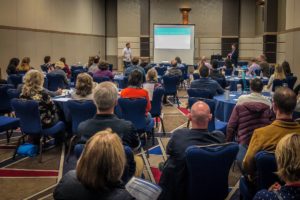The Young Adult Transition Association Conference, 2018, set in the beautiful town of Coeur D’alene, Idaho, just convened. Kellyn Smythe and Mike Sullivan from Pacific Quest were among many conference attendees drilling into the conference theme: the impact of technology on young adults. It was inspiring to be immersed in such great thinkers!

21st century young adults live in a different world than generations preceding them. Most salient appears to be screen time, which studies indicate averages close to 10 hours per day for 18-24 year olds, and surges much higher for those with tech addictions. A 2018 study by the University of San Francisco links increased loneliness, anxiety and depression with screen time. Young adult wilderness and residential treatment programs are being called to action to directly address the tech- driven and tech-reliant environment that floods our youth. The 2018 YATA conference was a summit for discussing factors contributing to this phenomenon.
Mike Sullivan, MA, LMHC teamed up with Johnny Tock, MA, LMHC to present at the conference. In their presentation, Mike and Johnny showcased the foundations of sustainable therapeutic growth – starting with how The Neurosequential Model of Therapeutics (NMT), a lens for looking at neurodevelopment and brain function, provides as approach that “re-wires the brain” from the bottom up. This equips young adults with tools for self-regulation, social engagement, and executive functioning and strengthens social and reward neurocircuitry, integrating the brain and making possible opportunities for behavioral interventions. NMT in conjunction with other evidence-based practices and holistic wellness prepares clients to better navigate the tech laden world. However, while the NMT foundation is a critical step, it is imperative to incorporate practical tools and awareness for technology exposure intentionally, as the graduate prepares for transition.
 Mike and Johnny then reviewed specific tech stressors and strategies for coping as the client nears graduation from residential/wilderness treatment. For example, is it more anxiety-provoking to open text messages, or is opening “hook up” apps likely to start a tailspin? Is reconnecting with a favorite video game going to catalyze an immediate regression? Mike and Johnny discussed stress management and desensitization strategies; critical in developing a roadmap for success for transition and beyond. The presentation and discussion points were relevant for active clinicians, program developers, admissions counselors, and educational consultants. It was a packed house with a very engaged audience.
Mike and Johnny then reviewed specific tech stressors and strategies for coping as the client nears graduation from residential/wilderness treatment. For example, is it more anxiety-provoking to open text messages, or is opening “hook up” apps likely to start a tailspin? Is reconnecting with a favorite video game going to catalyze an immediate regression? Mike and Johnny discussed stress management and desensitization strategies; critical in developing a roadmap for success for transition and beyond. The presentation and discussion points were relevant for active clinicians, program developers, admissions counselors, and educational consultants. It was a packed house with a very engaged audience.
All in all very great conference and look forward to returning next year!